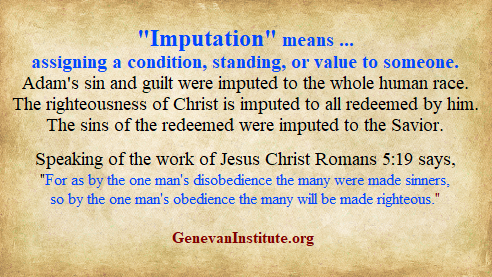
Lifting Up the Humble
(Westminster Shorter Catechism Q:28)
(watch our video)
by Bob Burridge ©2011, 2014, 2019
Humility is usually most appreciated when it’s seen in somebody else. Our fallen nature likes to feel self-important, and for others to see our importance too. But true humility is a mark of maturity.
In our last study the Apostle Paul used the example of Jesus Christ to teach us about being humble. In Philippians 2:5-8 he wrote; “Let this mind be in you which was also in Christ Jesus, who, being in the form of God, did not consider it robbery to be equal with God, but made Himself of no reputation, taking the form of a bondservant, and coming in the likeness of men. And being found in appearance as a man, He humbled Himself and became obedient to the point of death, even the death of the cross.”
Jesus took on the form of one of his creatures, humbled himself to serve others, and took their abuse. He suffered insults, torture, and an unjust execution as if he was a criminal, but the guilt he paid for wasn’t his own. He did all that to pay for the sins of his people, to satisfy for their crimes against God.
This was the most astounding act of humility ever. Remember how this passage of Scripture started out, “Let this mind be in you which was also in Christ Jesus,” The Apostle’s point was to challenge us to be like Jesus in his humility.
As with Jesus, true humility is to set aside self for the advance of God’s Kingdom. It’s when we take our rightful place in the amazing drama of God’s unfolding plan.
There’s more here than just a lesson about humility. After his time of humiliation was over, when he had accomplished his mission, our Lord was exalted. When we humbly put God’s glory and Kingdom first, he promises to lift us up.
This promise is a sure thing because it’s based on the work of Jesus Christ on our behalf. As his children we will be lifted up to be with the Savior forever in glory, yet we’ll always be humble before him.
But, we don’t act humbly in order to benefit from it. We do it out of a sincere thankfulness to God for his redeeming grace. The truly humble know they can’t lift themselves up. They admit that only the power of the Risen Savior can do that.
In the next section, Philippians 2:9-11, Paul continues his lesson. “Therefore God also has highly exalted Him and given Him the name which is above every name, that at the name of Jesus every knee should bow, of those in heaven, and of those on earth, and of those under the earth, and that every tongue should confess that Jesus Christ is Lord, to the glory of God the Father.”
Shorter Catechism 28 summarizes this:
Question 28: Wherein consisteth Christ’s exaltation?
Answer: Christ’s exaltation consisteth in his rising again from the dead on the third day, in ascending up into heaven, in sitting at the right hand of God the Father, and in coming to judge the world at the last day.
After he had humbled himself,
Jesus was most highly exalted.
Verse 9 begins with the word, “Therefore”. It was because of his humble suffering and death that Jesus Christ received his restored position. After he accomplished exactly what he came to do, he was ready to show his true glory again.
Hebrews 2:9, “But we see Jesus, who was made a little lower than the angels, for the suffering of death crowned with glory and honor, that He, by the grace of God, might taste death for everyone.”
Since his mission was completed, Jesus was again highly exalted. The word used in Philippians 2:9 means “Hyper-exalted” “huper-ups-O-o” (ὑπερυψόω). It’is only used this one time in the whole New Testament.
The exalting of Jesus Christ took place in three stages.
First was his Resurrection. Early that Sunday morning he rose from the tomb victorious over the grave. Sin’s penalty of death resulting in eternal separation from God was paid in full for all his people.
Next was his Ascension into glory. Forty days after his resurrection Jesus was received back into the full display of his glory in heaven.
Third, is what we call his Session. He returned to sit in his place by the Father where he shows his Sovereign Lordship over all creation. Hebrews 1:3, “… when He had by Himself purged our sins, sat down at the right hand of the Majesty on high,”
And yet to come, he will return to judge the world at the last day.
The name of Jesus
was exalted above every name.
The mysterious eternal work of the Triune God restored the Son from his humiliation back to the open display of his glory. His name as referred to here is not just a word used to identify him. In the times of the Bible names weren’t just picked out of a baby book. They were given to describe the person. Sometimes names were changed as the person got older and took on his special calling. God changed the names of Abram, Jacob, Saul of Tarsus and others. The name of Jesus was given by God himself. It identified his mission as the Savior.
There are many titles we give to Jesus. His names tell us about his wonder and works. We call him Lord, because he is ruler of all his creation. He is Jesus, the one who came to save his people from their sins. He is Christ, the Anointed one, God’s promised Messiah. He is Wonderful, our Good Shepherd, Counselor, the Mighty God
This text in Philippieans tells us that all creatures are to be humbled before Him.
Philippians 2:10-11, “… at the name of Jesus every knee should bow, of those in heaven, and of those on earth, and of those under the earth, and that every tongue should confess that Jesus Christ is Lord, to the glory of God the Father.”
The bowing of every knee and the confessing of every tongue includes every intelligent being. Those in heaven will be humbled before him to admit the wonder of all he is and has done. All redeemed humans, the cherubim, seraphim, the good angels and archangels. All those admitted into that special presence of God will honor him. Even those yet remaining on earth are humbled in subjection to him.
Those under the earth are included too. The word here is the ancient term for the “under-world”. It’s the place of the condemned (“ka-tach-THO-nios” — καταχθόνιος). It’s only used in this one place in the New Testament. It refers to the realm of the unredeemed humans and fallen creatures of the spirit realm.
The lost do not bow to confess him as their Savior and Comforter. However, even those who hate him won’t be able to deny his sovereign power and glory. All the powers that seem to be in control here on earth are not really in control at all. Jesus Christ is the real ruler of all things. He uses even rebellious earthly powers to carry out his plan, showing clearly the corruption of humanity. That further demonstrates his power to redeem his people by an amazing grace.
The Apostle Peter said in Acts 2:36, “Therefore let all the house of Israel know assuredly that God has made this Jesus, whom you crucified, both Lord and Christ.”
The Apostle Paul, in Romans 10:9, tells us that salvation is only possible to those who, openly admit that “Jesus is Lord” and to those who believe that “God raised Him from the dead”.
The Apostle John wrote in Revelation 17:14 about the victorious Jesus as the Lamb of God, “… for He is Lord of lords and King of kings; and those who are with Him are called, chosen, and faithful.”
Christ’s humble work and exaltation is
to bring glory to the Triune God.
This is the purpose of all that God created, has done, and is. Everything is ordered to declare and to display the Glory of God. By his Covenant Promises the exaltation of Christ also benefits his people. Acts 5:31, “Him God has exalted to His right hand to be Prince and Savior, to give repentance to Israel and forgiveness of sins.”
The exaltation of Christ accomplishes both objectives as part of the same plan. His exaltation brings glory to God the Father, and brings repentance to his people, the true Israel, as he intercedes for them, and forgives all their sins.
As we fight the enemy of our souls, we don’t do it as individuals sent out to war alone. We’re redeemed to go out together – as an army, equipped and organized as a unit. We’re fellow soldiers, each lending his talent, resources, and time under the Captain of our souls who is victorious and exalted above all.
Remember how this passage of Scripture started out . Philippians 2:5, “Let this mind be in you which was also in Christ Jesus, …”
Jesus is our example. His humility teaches us to put what God says and calls us to do first in our lives. Obeying our loving Savior should have priority over all our temporary comforts which only last a short while and are gone. Admitting that his grace is our only hope of being restored to fellowship with God.
The exalting of Christ encourages us that the promises God made can’t fail. He will lift us up. As his children we should trust our Heavenly Father to bless us by his grace and mercy.
Jesus is also the one who makes us able to do what God calls us to do. As our exalted redeemer, he lives and reigns over all things for the redemption and care of his people. He makes us able to live humbly for him, to know his peace, and to trust his promises.
Just as Jesus was exalted
we share in his victory as his children.
We who are redeemed by him should have this in mind. We have a victorious and exalted Savior who is always there to care for us.
Even now we have victory over the world, and a victorious Lord as our loving shepherd. We are nothing more than redeemed sinners who face challenges, pain, and imperfection. But those redeemed by that amazing grace are, and always will be, God’s adopted children.
As we live here going through our daily challenges and routines, we should humbly accept our place as the adopted children of the Living Creator. We leave the exalting part to him.
Our job is to serve him faithfully, obeying to the best of our ability as he strengthens us. We should remember that our failures were taken up by our suffering Savior almost 2000 years ago. Instead of letting our faults and failures discourage us, we bring them to the Risen Christ. We ask him to help us never to do those foolish things again.
We have God’s own promise in Matthew 23:12. There Jesus said, “And whoever exalts himself will be humbled, and he who humbles himself will be exalted.” James 4:10 says, “Humble yourselves before the Lord, and he will exalt you.”
There is also the exalting we are going to enjoy
when this life is over.
One day we too will be raised to glory when our work on earth is done. There in heaven we will live forever with our Redeemer and all the others who are redeemed.
We have no business taking on the defeated attitude of the world around us. We who are redeemed are God’s children.
Those without Christ value most highly those unsatisfying and fleeting moments of ease, comfort, and human glory. Our Savior humbled himself so that we could be adopted into the family of God, and enjoy the blessings of living humbly, serving God and others.
Our Savior was exalted when his work was completed. As reigning King he carries us along as his precious ones. He has prepared our place in heaven where we will spend eternity with him.
Our attitude should be one of confidence, instead of discouragement. We should be encouraged through whatever comes along, remembering that since Christ humbled himself and was exalted again to glory, we too should live humbly before God and others, and the One who redeemed us will always be there to lift us up.
(Bible quotations are from the New King James Version unless otherwise noted.)







